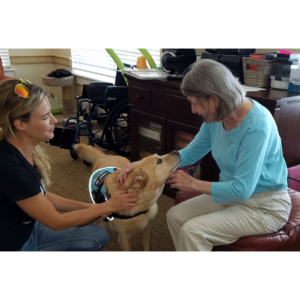4 Strategies to Help Families Plan for End-of-Life Care
Navigating sickness and death is difficult for anyone, and families who see their loved ones’ health fading can have a particularly difficult time preparing for what’s to come. Your senior care facility will play an important role in helping families through this period. Consider incorporating these four strategies in your facility to give families the support they need.
Focus on Educating and Answering Questions

Stella Barnes, RN, Risk Manager at Westside Terrace Healthcare
As a loved one’s health declines, the family often faces confusion and uncertainty. Stella Barnes, RN, has served in long-term healthcare for over 20 years. She notes that at Westside Terrace Healthcare, where she is the Risk Manager, staff work to educate families about what will happen as their loved ones’ health declines.
“I’ve found that there’s a lack of education in the community about end-of-life care,” says Barnes. “People tend to get confused about the role of hospice, but they’re usually open and receptive when you explain the benefits it offers.”
Barnes notes that the facility has paperwork prepared to give to families to help them understand important topics like the myths and realities of feeding tubes and dehydration. “Even in a home setting, people often don’t know what to expect from end-of-life care,” says Barnes. When families are more aware of what to expect, they’ll be better able to make well-informed choices.
Help Residents (and Family Members) Discuss End-of-Life Wishes
It’s also important to help facilitate discussions with everyone in the family – including the patient – about what they would like to happen at the end of life.

Natalie Mica, MEd, LPC, CART, CDWF, a Licensed Professional Counselor
Natalie Mica, MEd, LPC, CART, CDWF, is a Licensed Professional Counselor in private practice in Houston who helps clients navigate grief, loss, and major life transitions. “Actually talking about the thoughts, feelings, and emotions brings a sense of relief and the opportunity to bring family together,” says Mica.
“Even as it is difficult, being with death is one way to acknowledge and celebrate life and what the dying family member means to the family. Some individuals will naturally want and need to talk more both about death and in their goodbye words to the departing family member. The dying family member may also have things they want to say before they die.”
But these conversations need to be handled gently and tactfully. “It is important to honor each individual’s level of comfort around discussions of death and give them the choice of whether or not to say goodbye and how they want to do that,” Mica recommends.
“Each individual processes loss differently, and it is important that individuals feel authentic during this time rather than falling into group think. One way to allow this is to gather and ask questions about how each person feels, if they intend to say goodbye, how they prefer to say goodbye and what support they may need in the process.”
Connect Families to Local Support Services
According to Mica, families often lack knowledge of the local support services that are available to help them through the end-of-life process. Your facility can help to connect families to services such as:
- End of life housing options
- Legal help for end-of-life healthcare directives, wills, and healthcare directives
- Financial planners
- Hospice services
- Spiritual clergy and church community groups
- Funeral homes
- Mental health providers who work with grief and loss
All of these services can work together to give families comprehensive support.
Care for the Families, Too
While the patient may be your facility’s primary responsibility, you also need to care for the families. Barnes explains that staff play a large role in helping families to feel comfortable. “We bring snacks and drinks and check on families more frequently during these times,” says Barnes. These extra touches can make a big difference for families.
By reevaluating and strengthening your facility’s approach to end-of-life care, you can give families the support and knowledge they need to navigate this trying time.
I Advance Senior Care is the industry-leading source for practical, in-depth, business-building, and resident care information for owners, executives, administrators, and directors of nursing at assisted living communities, skilled nursing facilities, post-acute facilities, and continuing care retirement communities. The I Advance Senior Care editorial team and industry experts provide market analysis, strategic direction, policy commentary, clinical best-practices, business management, and technology breakthroughs.
I Advance Senior Care is part of the Institute for the Advancement of Senior Care and published by Plain-English Health Care.
Related Articles
Topics: Executive Leadership , Featured Articles , Resident Care










